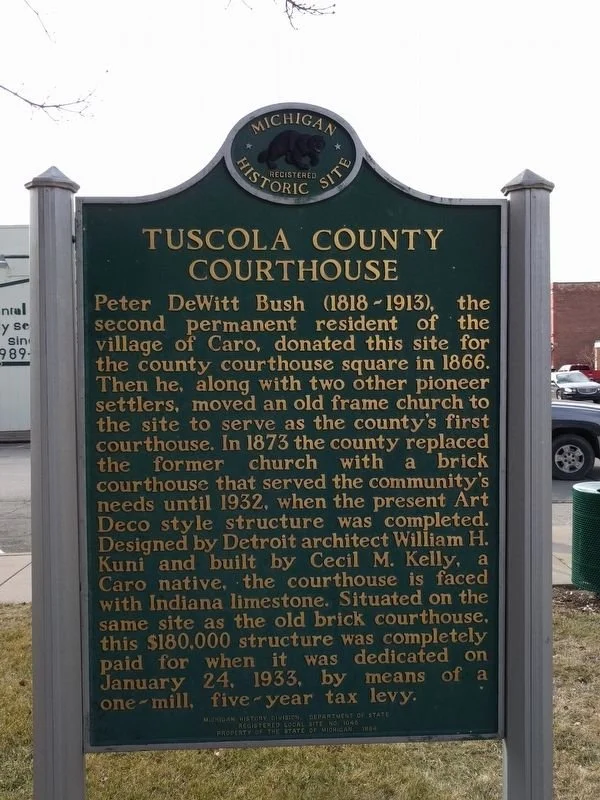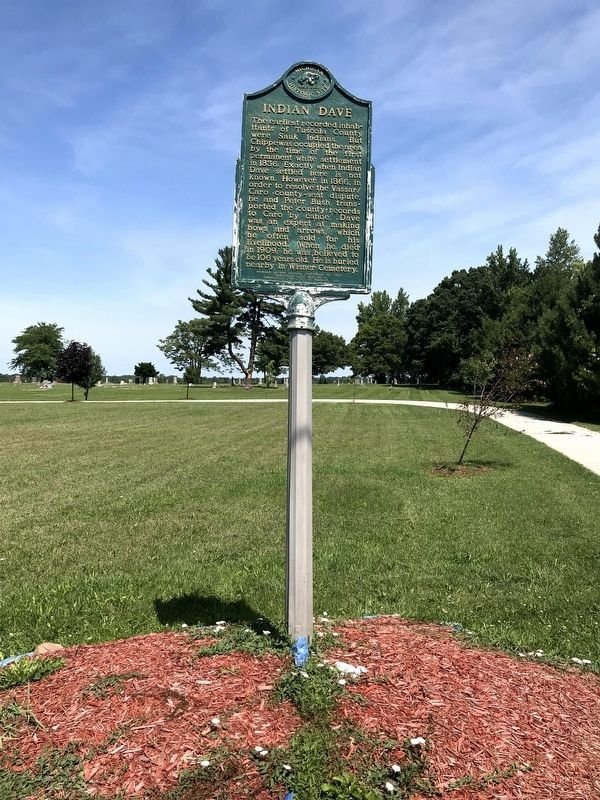Watrousville United Methodist Church
Circuit riders, who traveled through local villages, served the Watrousville United Methodist Church when it was established in 1856.
Watrous General Store
Aaron Watrous and his crew of loggers came here in 1852 to cut the virgin pine of the Cass River Valley. In 1860 he platted the town, naming it Watrousville, and a few years later constructed this building as a general store.
Vassar’s Logging Era
Cork pine grew in abundance along the Cass River and was much in demand. These kings of the forest grew to a height of 150 feet. With forests depleted, a diversified economy developed here—agriculture, manufacturing, and commercial business.
Tuscola County Fair
On March 11, 1882, thirty-three years after the nation’s first state fair was held in Detroit, the Tuscola County Fair was organized as the Caro District Agricultural Association.
Tuscola County Courthouse
Peter DeWitt Bush (1818-1913), the second permanent resident of the village of Caro, donated this site for the county courthouse square in 1866. In 1873 the county replaced the former church with a brick courthouse that served the community's needs until 1932 when the present Art Deco style structure was completed.
Tuscola County Advertiser
The Tuscola County Advertiser began publishing on August 21, 1868. The city’s oldest surviving business establishment was founded by Henry G. Chapin, a native of Conesus, New York.
Trinity Episcopal Church
This skillfully designed board and batten Gothic Revival church first served local Episcopalians in 1880. The congregation had been formed in 1871, the year the town was incorporated.
State Reward Road No. 1
The state highway system began with the State Reward Road program, created by the Michigan Legislature in 1905. The program provided "rewards" to local governments for road improvements made according to state standards. Elkland Township was the first municipality to receive a reward.
Peninsular Sugar Refining Company
The beet sugar industry in Michigan began growing rapidly in the late nineteenth century and is still a popular crop to this day. With more than a century under its belt, there is no shortage of history, Peninsular Sugar Refining Company included.
Millington School District No. 2
In 1884 Millington citizens decided to construct a modern brick building. Between 1947 and 1970 eighteen rural schools consolidated to form the Millington Community School District.
Millington-Arbela Historical Society
The Millington-Arbela Historical Society is located in downtown Millington in the old Millington Bank building. Dedicated to ‘preserve yesterday for tomorrow’, this small nonprofit group offers visitors to the Millington and Arbela area a chance to step back in time with displays featuring turn of the century equipment, founding businesses, old school buildings, military gear from days gone by, and much more.
Mayville Museum
The Mayville Museum is located in the thumb of Michigan. We are open Friday & Saturdays during the summer months 11:00 am- 3:00 pm.
Caro Roadhouse Museum
The Caro Roadhouse Museum is a small, public museum owned by the City of Caro, Michigan. We conduct a series of annual open house events, designed to attract a variety of age groups and interests, often displaying collections belonging to our local residents. All of our events are free of charge and wheelchair accessible.
Juniata House
In 1851, Patrick McGlone (1810-1884) settled near here. Later, he built a one-story Greek Revival Style building that he named “Juniata House” where he provided lodging and food for travelers, as well as “good Barns” stocked “with hay and grain.” His family served travelers for fourteen years.
Indian Dave
Indian Dave was one of the last Chippewas to hunt, fish, and trap in the old manner in the Tuscola County area. Dave was born around 1803 and given the name Ishdonquit. When he died in 1909, he was believed to be 106 years old. He is buried nearby in Wisner Cemetery.
Gilford United Methodist Church
In 1889 Charles and Naomi Phipps donated land for a church building. Church members laid the cornerstone later that year. In 1968, through a merger with the Methodist denomination, the name became the Gilford United Methodist Church.
Frankenhilf
In 1849 Pastor Ferdinand Sievers of Bay County purchased over fifteen hundred acres of virgin forest here in Tuscola County to establish a colony of immigrants from revolution-torn Germany. They named their community Frankenhilf, combining Franconia, a district of Bavaria, and hilf, meaning assistance.
First Presbyterian Church of Caro
For the first year, this small group of Presbyterians held their worship and prayer services in the homes of members. Then in 1880, they erected their first house of worship on Lincoln and Pearl Streets. It has had no structural alterations since construction. A regal structure, it features a corner tower and stained glass windows.
Elkland Township Hall
This hall was built in 1881 as the center of government activity for Elkland Township. Erected at a cost of twenty-six hundred dollars, it was the first brick structure in Cass City.



















